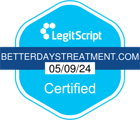Ever felt lost in the struggle to reclaim your well-being from the clutches of mental health challenges?
Curious about the transformative power of Intensive Outpatient Programs (IOPs)?
Join us on a dynamic journey as we navigate through the world of IOPs at Better Days Treatment, where innovation bridges the gap between conventional therapy and inpatient care.
Uncover the layers, explore the phases, and embrace the lifelines they offer to those battling mental health conditions.
Are you ready to make informed decisions and step into a sunnier mental horizon?
Understanding the Concept of the IOP Program
Intensive outpatient programs offer flexible treatment options for mental health conditions. Combining therapy, group counseling, and support, IOP program mental health creates a structured environment, allowing individuals to continue their daily routines. The adult intensive outpatient program focuses on promoting recovery and addressing the individual needs of each participant. With a strong emphasis on personalized treatment, IOP programs play a vital role in the continuum of mental health care, bridging the gap between inpatient treatment and traditional outpatient services.
Components of an Effective IOP Program
Group therapy sessions in an adult intensive outpatient program (IOP) foster a supportive and collaborative environment. Individual therapy with a licensed psychiatrist or therapist addresses specific mental health needs. Partial hospitalization programs offer a higher level of care within the IOP framework. Cognitive behavioral therapy promotes positive change, a key component of effective IOP programs. Additionally, involving loved ones in family therapy sessions enhances overall outcomes.

Mental Health Conditions
An adult intensive outpatient program offers comprehensive mental health care for various conditions. Anxiety and depression can be effectively addressed through therapy and support. Individuals with substance abuse disorders can benefit from the structured environment and treatment options provided. For those with bipolar disorder, offer ongoing support and management. Post-traumatic stress disorder symptoms can be managed effectively through therapy and counseling. Additionally, IOP programs can address eating disorders such as anorexia or bulimia, providing specialized treatment and support.
Role of Personalized Treatment
Personalized treatment plans in an adult intensive outpatient program (IOP) are crucial in addressing individual mental health needs. Clinicians assess progress approaches accordingly, ensuring effective care. Incorporating art therapy and creative outlets enhances healing and expression, while educational groups provide vital information and coping strategies. Next-step planning facilitates a smooth transition to continued care, ensuring long-term well-being. Even if you’ve undergone treatment in another city or state, there are treatment centers in most majors cities so it’s easy to find IOP program Houston, Dallas, LA or New York. The personalized approach prioritizes individual growth and recovery.
Different Phases of IOP Program for Mental Health Treatment
IOP programs for mental health treatment consist of several different phases.
- Initial Assessment: Tailored care is determined after evaluating individual needs.
- Active Treatment: Regular therapy sessions and group counseling tackle concerns head-on.
- Discharge Planning: Aftercare and relapse prevention strategies take center stage.
- Step-Down Options: Gradual transition to intensive outpatient or outpatient care based on progress.
- Maintenance: Ongoing support and follow-up care solidify the journey toward lasting well-being.
How Does an IOP Program Adapt to Individual Needs?
- Personalized treatment plans in IOP programs cater to specific mental health concerns, ensuring individualized care.
- Flexibility in scheduling allows for appointments and sessions to accommodate individual needs.
- Ongoing assessments and clinician adjustments ensure treatment approaches are tailored to individual progress.
- Collaborative goal-setting aligns treatment with personal recovery objectives.
- A variety of therapeutic modalities cater to different learning and processing styles.
What is the usual duration of an IOP Program?
The duration varies based on individual needs and progress. On average, programs can last 6-12 weeks but may be longer for complex conditions. Assessments help determine the appropriate duration, and extensions are possible based on additional support needs before transitioning to outpatient care.
How are IOP Outcomes Measured and Evaluated?
IOP program outcomes are measured by assessing mental health symptoms and functioning. This includes self-report questionnaires and clinician ratings. The effectiveness is evaluated based on improvements in overall well-being and quality of life, relapse rates, and sustained recovery. Feedback from participants and their loved ones also contributes to program evaluation.

Insurance Coverage
Insurance coverage for IOP programs is common as part of mental health benefits. Verify coverage with your insurance provider to understand specific limitations and advantages. Co-pays and deductibles may apply. Financial assistance or sliding scale fees may be available for those without insurance. Pre-authorization or a referral from a primary care physician might be required.
Are IOP And PHP The Same?
While both Intensive Outpatient Programs (IOP) and Partial Hospitalization Programs (PHP) are forms of treatment for mental health conditions, there are some critical differences between the two.
IOP typically involves structured therapy sessions during the day or evening, allowing individuals to continue their daily activities while receiving intensive treatment. It is characterized by a lower level of care compared to PHP.
On the other hand, PHP provides a higher level of care and requires individuals to attend treatment for several hours a day, typically five days a week. In PHP, individuals spend more time in therapy and receive more support and supervision than in IOP.
PHP is often recommended for individuals who require a more intensive treatment approach due to the severity of their mental health condition or significant functional impairments.
Conclusion
In conclusion, an Intensive Outpatient Program (IOP) is a highly effective and flexible treatment option for individuals struggling with mental health conditions. At Better Days Treatment, we offer personalized care, structured therapy sessions, and a supportive community to help you on your journey toward recovery.
With different phases and durations tailored to individual needs, an IOP program can provide the necessary tools and strategies to manage symptoms, improve coping skills, and enhance overall well-being.
Moreover, many insurance plans cover the cost, making it accessible to a broader range of individuals.
If you or a loved one is seeking mental health treatment, we encourage you to get in touch with our team to learn more about the benefits of an IOP program and how it can support your path to healing.


